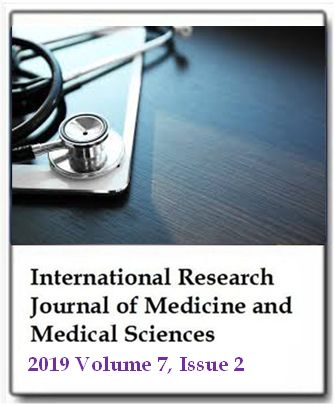Deoxypyridinoline bone height after oral implant surgery in menopause women
Beatriz Cepeda De Romero, Diana Carolina Cañon Guarnizo, Lina Marcela Orozco Herrera, Sofìa Cepeda Tarazona and Maria Alexandra Polo PachecoInternational Research Journal of Medicine and Medical Sciences
Published: June 3 2019
Volume 7, Issue 2
Pages 48-52
DOl: https://doi.org/10.30918/IRJMMS.72.19.030
Abstract
The ratio Deoxypyridinoline / Creatinine measured in urine (DPD/Cr) is the most sensitive and specific marker of early metabolic breakdown of collagen I, and therefore, of osteopenia and bone resorption. The normal values change with age and gender; in male adults the normal range is 2.3 to 5.4 nmol/mmol and in women is 3.0 to 7.4 nmol/mmol. It has been shown that osteopenia can lead to osteoporosis and to failure of implant osseointegration. The objective of this study was to associate levels of DPD/Cr in urine with bone height measured by tomography before surgery and three months after oral implant surgery in menopausal women. 20 healthy or systemically controlled postmenopausal women who underwent surgery implants, were selected by convenience for the study. All implants were: Titanium SIS® Implants (CIEO Foundation, Colombia) customized according to the patient requirements indicated in the CBCT. The implant length varied in the range 5 to 15 mm, internal diameter: 3 to 5 mm, internal hexagon: 2.4 mm, and screw: 1.85 × 0.35 mm. DPD values in urine were measured by a Chemical Luminescence Immune test and bone height in mm was measured in a tomography on implant zone before the surgery and 3 months after implant surgery. The average age of the patients was 61.2 ± 17.31 years and the number of implants 1-4/patient. The ratio DPD/ Cr showed a high average of 9.594 ± 0.475 nmol/mmol. Average pre-surgery bone height was 15.23 ± 1.41 mm and post-surgery decreased to 13.78 ± 1.16 mm. This difference was significant (t paired, p = 0.001). The Pearson correlation test showed a high association (p = 1) between the elevation of DPD/Cr and the decrease in bone height. There is a significant association between the change in concentrations of urinary creatinine-corrected deoxypyridinoline and bone resorption in menopausal women, three months after oral implant surgery.
Keywords: Bone resorption, creatinine, deoxypyridinoline, oral implants, oral surgery.
Full Text PDFThis article is published under the terms of the Creative Commons Attribution License 4.0

